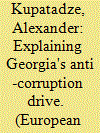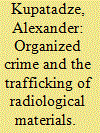| Srl | Item |
| 1 |
ID:
111136


|
|
|
|
|
| Publication |
2012.
|
| Summary/Abstract |
This article explains Georgia's achievements against rampant corruption that plagued the country for decades. It demonstrates how Georgia has moved from being a 'failed state' to the state with low corruption rates following the Rose Revolution of 2003. It is argued that several internal and external drivers motivated Georgian leadership to fight corruption in the post-revolutionary setting, including drawing legitimacy from anti-corruption campaign and using it for political purposes, 'the West' as allure and desire to drift away from Russian trajectory of development.
|
|
|
|
|
|
|
|
|
|
|
|
|
|
|
|
| 2 |
ID:
069106


|
|
|
| 3 |
ID:
096497


|
|
|
|
|
| Publication |
2010.
|
| Summary/Abstract |
Based on unique empirical data, including interviews with smugglers of radiological materials and the investigators who track them, this article discusses nuclear smuggling trends in the former Soviet republic of Georgia. Smuggling in Georgia mainly involves opportunist smugglers and amateurs, as opposed to professional criminals and terrorists; however, this does not mean that radiological smuggling is devoid of professionalism or organization. The article demonstrates that professional criminals are rarely involved in smuggling due to the unreliable nature of the market for radiological materials and the threat radiological smuggling could pose to professional criminals' ability to wield political power and operate legal commercial enterprises.
|
|
|
|
|
|
|
|
|
|
|
|
|
|
|
|
| 4 |
ID:
085531


|
|
|
|
|
| Publication |
2008.
|
| Summary/Abstract |
More than a decade of post-Soviet transition has given rise to political-criminal clans in Kyrgyzstan, thus blurring the boundaries between the legitimate sector and the criminal underworld. The Tulip Revolution, which is frequently referred to as an 'anti-crime' and an 'anti-corruption' event, was followed by increasing political violence and more powerful organized crime groups. This article looks at the reasons for these developments. It argues that the involvement of criminal figures in the revolutionary process, the weakness of the political opposition to Akaev's outgoing regime and post-revolutionary uncertainty and chaos were the main factors. After temporary confusion, the incoming elites mobilized resources, revitalized the corruption pyramid schemes and fought back criminal leaders in order to reassert themselves. Following the assassination of two of the most influential underworld leaders in unclear circumstances, the incumbent regime and new ruling family are progressively consolidating their power. So far, however, the increased power of the ruling regime has not strengthened the Kyrgyz state.
|
|
|
|
|
|
|
|
|
|
|
|
|
|
|
|
| 5 |
ID:
155304


|
|
|
|
|
| Summary/Abstract |
Georgia is the only country in the post-Soviet region where incarceration rates significantly grew in the 2000s. Then in 2013, the prison population was halved through a mass amnesty. Did this punitiveness and its sudden relaxation after 2012 impact attitudes to the law? We find that these attitudes remained negative regardless of levels of punitiveness. Furthermore, the outcomes of sentencing may be less important than procedures leading to sentencing. Procedural justice during both punitiveness and liberalisation was not assured. This may explain the persistence of negative attitudes to law. The Georgian case shows that politically-driven punitive turns or mass amnesties are unlikely to solve the problem of legal nihilism in the region.
|
|
|
|
|
|
|
|
|
|
|
|
|
|
|
|
| 6 |
ID:
078968


|
|
|
|
|
| Publication |
2007.
|
| Summary/Abstract |
The article focuses on radiological smuggling and its connection with uncontrolled territories, the "grey zones" that have emerged as important conduits for illicit contraband, including the trafficking of radioactive materials. The presence of "grey zones," together with poor border security, weak law enforcement and corruption in government structures, are the most important regional factors that facilitate radiological smuggling. The paper documents the collaboration between criminals, politicians, military and security officers and entrepreneurs in this kind of illicit activity and argues that the fight against radiological smuggling has to shift its focus from technical issues to intelligence gathering and analysis.
|
|
|
|
|
|
|
|
|
|
|
|
|
|
|
|